2010高考二轮复习英语教案——专题八 非谓语动词和独立主格结构
完整版)高中英语独立主格结构详细讲解

完整版)高中英语独立主格结构详细讲解独立主格独立主格结构是指带有自己主语的非谓语动词分句或无动词分句。
由于独立主格结构有自己的逻辑主语,与主句无关,因此传统语法称其为“独立主格结构”。
实际上,独立主格结构是一种从属分句,与主句共同表达一个完整的意思,通常在句中起状语分句的作用。
独立主格结构可放于句首或句尾,用逗号和主句隔开。
独立主格结构由名词或代词作逻辑主语和非谓语动词分句或无动词分句组成。
非谓语动词分句包括现在分词、过去分词和不定式,无动词分句包括名词、形容词、副词和介词短语。
基本形式为:名词普通格/代词主格+非谓语动词分句/无动词分句,with引导的复合结构。
现在分词表示前面名词或代词主动进行的动作或状态,过去分词表示前面名词或代词被动完成的动作或所处的状态,不定式表示将来的动作。
例如,“The man lay there。
his handstrembling.”,“So many students being ab sent。
the meeting had to be put off.”,“The boy lay on his back。
his hands crossed under his head.”,“He suggested going for a ic。
Mary to provide the food.”。
在独立主格结构中,being或havingbeen有时可以省略。
These are the first two books。
and the third one is set to be released next month。
We will gather at 7:30.and the n will XXX 8.Many people。
including women and children。
joined in the work。
He XXX。
The XXX。
so we had to wait outside for a while。
(完整版)非谓语动词和独立主格
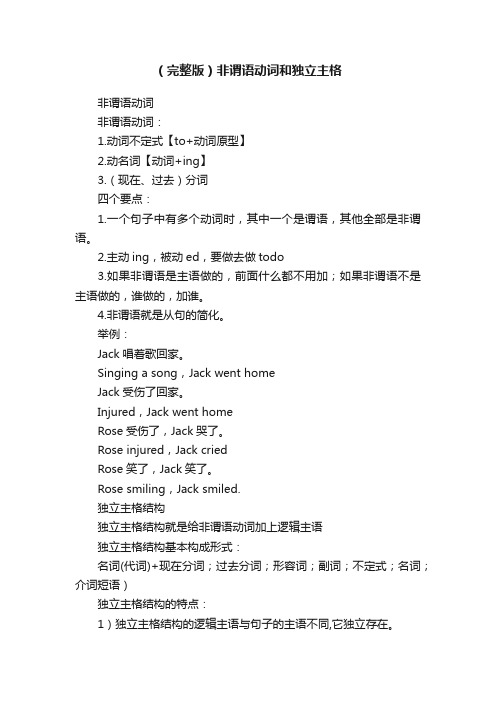
(完整版)非谓语动词和独立主格非谓语动词非谓语动词:1.动词不定式【to+动词原型】2.动名词【动词+ing】3.(现在、过去)分词四个要点:1.一个句子中有多个动词时,其中一个是谓语,其他全部是非谓语。
2.主动ing,被动ed,要做去做todo3.如果非谓语是主语做的,前面什么都不用加;如果非谓语不是主语做的,谁做的,加谁。
4.非谓语就是从句的简化。
举例:Jack唱着歌回家。
Singing a song,Jack went homeJack受伤了回家。
Injured,Jack went homeRose受伤了,Jack哭了。
Rose injured,Jack criedRose笑了,Jack笑了。
Rose smiling,Jack smiled.独立主格结构独立主格结构就是给非谓语动词加上逻辑主语独立主格结构基本构成形式:名词(代词)+现在分词;过去分词;形容词;副词;不定式;名词;介词短语)独立主格结构的特点:1)独立主格结构的逻辑主语与句子的主语不同,它独立存在。
2)名词或代词与后面的分词,形容词,副词,不定式,介词等是主谓关系。
3)独立主格结构一般有逗号与主句分开。
这种结构与主句不发生句法上的联系,它的位置相当灵活,可置于主句前、主句末或主句中,常由逗号将其与主句分开。
在句中作状语,相当于一个状语从句。
需特别注意的是,独立主格结构与主句之间不能使用任何连接词。
这里分形式具体举例,以便熟悉知识点。
1.名词(代词)+现在分词Time permitting, I will go with you时间允许的话,我就和你一起走。
2.名词(代词)+过去分词The work done, he went back home.工作完成后,他回家了。
3.名词(代词)+不定式在“名词/代词+动词不定式”结构中,动词不定式和它前面的名词或代词如果存在着逻辑上的主谓关系,动词不定式则用主动的形式;如果是动宾关系,则用被动形式。
英语语法——独立主格结构

英语语法第八章独立主格结构非谓语动词作状语时,它的逻辑主语应该是句子的主语。
但有时非谓语动词带有自己的主语,从而在结构上与主语不发生关系,我们称之为独立主格结构(Absolute Construction)。
其实,所谓“独立主格结构”也并非真正独立,它还是一种从属的结构。
一、非谓语动词独立主格结构在独立主格结构中,非谓语动词和它前面的名词或代词存在着逻辑上的主谓关系。
Such an able man to help you,you will surely succeed sooner or later.有这么能干的人来帮你, 你迟早一定会成功的。
(such an able man和 to help you 之间存在着主谓关系)= Since such an able man will help you, you will surely succeed sooner or later. He seating himself at the desk, his mother began to tell him a story.他在书桌旁坐好后,他母亲开始给他讲故事。
(seating himself at the desk拥有了自己的逻辑主语he,注意是“主格”)= When he seated himself at the desk, his mother began to tell him a story. The key to the bike lost, he had to walk to school.由于丢了自行车钥匙,他只好步行去学校。
(lost 的逻辑主语是the key,lost 也可以用完成式having been lost)= Because the key to the bike had been lost, he had to walk to school.A.不定式“独立主格结构”在“逻辑主语+动词不定式”结构中,动词不定式和它前面的名词或代词存在着逻辑上的主谓关系。
非谓语动词与独立主格结构
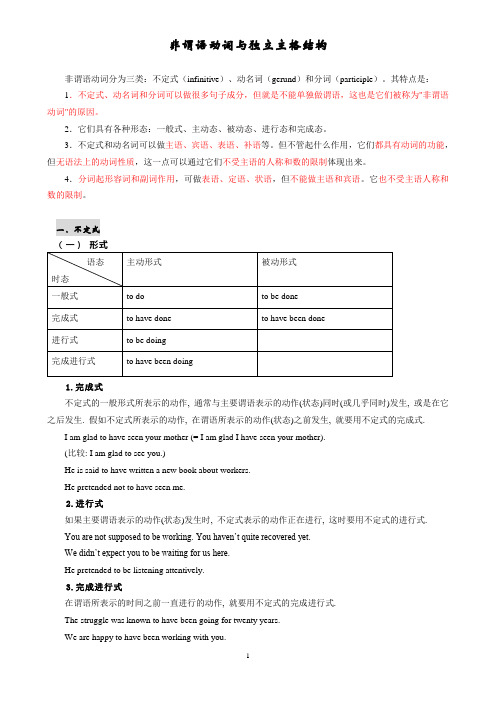
非谓语动词与独立主格结构非谓语动词分为三类:不定式(infinitive)、动名词(gerund)和分词(participle)。
其特点是:1.不定式、动名词和分词可以做很多句子成分,但就是不能单独做谓语,这也是它们被称为"非谓语动词"的原因。
2.它们具有各种形态:一般式、主动态、被动态、进行态和完成态。
3.不定式和动名词可以做主语、宾语、表语、补语等。
但不管起什么作用,它们都具有动词的功能,但无语法上的动词性质,这一点可以通过它们不受主语的人称和数的限制体现出来。
4.分词起形容词和副词作用,可做表语、定语、状语,但不能做主语和宾语。
它也不受主语人称和数的限制。
一.不定式1.完成式不定式的一般形式所表示的动作, 通常与主要谓语表示的动作(状态)同时(或几乎同时)发生, 或是在它之后发生. 假如不定式所表示的动作, 在谓语所表示的动作(状态)之前发生, 就要用不定式的完成式.I am glad to have seen your mother (= I am glad I have seen your mother).(比较: I am glad to see you.)He is said to have written a new book about workers.He pretended not to have seen me.2.进行式如果主要谓语表示的动作(状态)发生时, 不定式表示的动作正在进行, 这时要用不定式的进行式.You are not supposed to be working. You haven’t quite recovered yet.We didn’t expect you to be waiting for us here.He pretended to be listening attentively.3.完成进行式在谓语所表示的时间之前一直进行的动作, 就要用不定式的完成进行式.The struggle was known to have been going for twenty years.We are happy to have been working with you.4.被动式当不定式的逻辑上的主语是不定式所表示的动作的承受者时, 不定式一般要用被动形式.It is an honor for me to be asked to speak here.She hated to be flattered.He wanted the letter to be typed at once.【例】1) Sir Denis, who is 78, has made it known that much of his collection ______ to the nation.A) has left B) is to leave C) leaves D) is to be left结合选项来看,全句的意思:“78岁的丹尼斯爵士已经向众人宣布他的许多收藏品将留给国家"。
高三英语高考语法独立主格结构教案

一、独立主格结构的形式英语中,独立主格结构的形式有两类:一类是:名词或代词跟形容词、副词、介词短语、非谓语动词连在一起,构成独立主格结构。
另一类是:介词with / without后接名词或代词再跟形容词、副词、介词短语、非谓语动词连在一起,构成独立主格结构。
A. 名词或代词 + 形容词、副词、介词短语、非谓语动词1.名词 / 代词 + 不定式。
如:A house to be built, we must save every cent. 由于要建一座房子,我们必须节省每一分钱。
Now here is Li Lei, Wei Fang to come tomorrow. 现在李蕾来了,魏方明天到。
2.名词 / 代词 + -ing分词。
如:The bus coming here soon, we should get everything ready. 汽车很快就要来了,我们应该把一切事情准备好。
Mother being ill, Li Lei was very worried. 母亲病了,李蕾非常焦急。
3.名词 / 代词 + 动词的过去分词。
如:His cup broken, he used his bowl instead. 茶杯破了,他就用碗来代替。
4.名词 / 代词 + 形容词。
如:The ground muddy, we should be careful. 地面泞泥,我们应该小心。
5.名词 / 代词 + 副词。
如:The class over, we all went out to play. 下课后,我们都出去玩。
6.名词 / 代词 + 介词短语。
如(from ):Glasses in his hand, he asked where his glasses were. 手里拿着眼镜,他问他的眼镜哪去了。
B. 介词with / without + 名词或代词 + 形容词、副词、介词短语、非谓语动词1. with / without + 名词或代词 + 形容词He spoke to us with his mouth full of food. 她口里含着食物跟我们说话。
语法精讲第8章独立主格结构
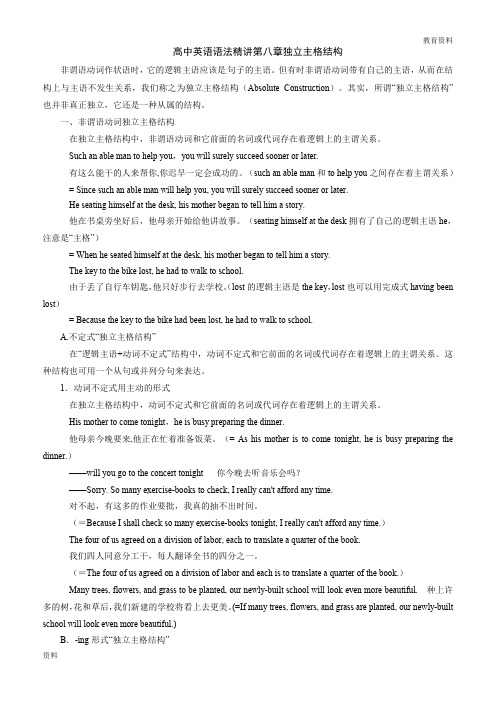
高中英语语法精讲第八章独立主格结构非谓语动词作状语时,它的逻辑主语应该是句子的主语。
但有时非谓语动词带有自己的主语,从而在结构上与主语不发生关系,我们称之为独立主格结构(Absolute Construction)。
其实,所谓“独立主格结构”也并非真正独立,它还是一种从属的结构。
一、非谓语动词独立主格结构在独立主格结构中,非谓语动词和它前面的名词或代词存在着逻辑上的主谓关系。
Such an able man to help you,you will surely succeed sooner or later.有这么能干的人来帮你,你迟早一定会成功的。
(such an able man和to help you之间存在着主谓关系)= Since such an able man will help you, you will surely succeed sooner or later.He seating himself at the desk, his mother began to tell him a story.他在书桌旁坐好后,他母亲开始给他讲故事。
(seating himself at the desk拥有了自己的逻辑主语he,注意是“主格”)= When he seated himself at the desk, his mother began to tell him a story.The key to the bike lost, he had to walk to school.由于丢了自行车钥匙,他只好步行去学校。
(lost的逻辑主语是the key,lost也可以用完成式having been lost)= Because the key to the bike had been lost, he had to walk to school.A.不定式“独立主格结构”在“逻辑主语+动词不定式”结构中,动词不定式和它前面的名词或代词存在着逻辑上的主谓关系。
非谓语的复合结构和独立主格
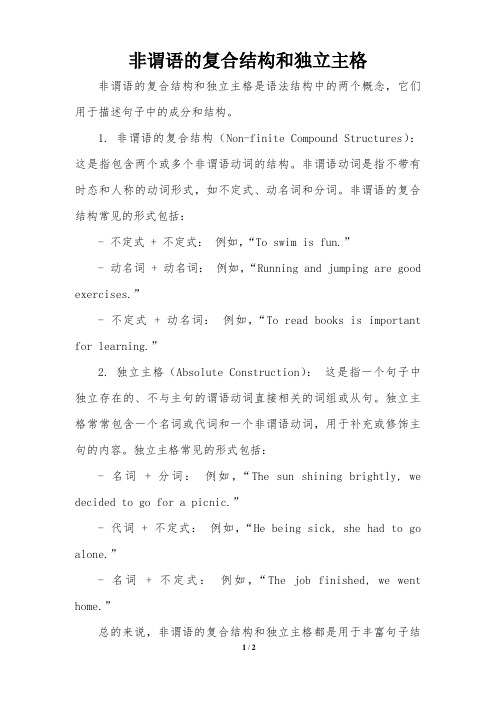
非谓语的复合结构和独立主格非谓语的复合结构和独立主格是语法结构中的两个概念,它们用于描述句子中的成分和结构。
1. 非谓语的复合结构(Non-finite Compound Structures):这是指包含两个或多个非谓语动词的结构。
非谓语动词是指不带有时态和人称的动词形式,如不定式、动名词和分词。
非谓语的复合结构常见的形式包括:
- 不定式 + 不定式:例如,“To swim is fun.”
- 动名词 + 动名词:例如,“Running and jumping are good exercises.”
- 不定式 + 动名词:例如,“To read books is important for learning.”
2. 独立主格(Absolute Construction):这是指一个句子中独立存在的、不与主句的谓语动词直接相关的词组或从句。
独立主格常常包含一个名词或代词和一个非谓语动词,用于补充或修饰主句的内容。
独立主格常见的形式包括:
- 名词+ 分词:例如,“The sun shining brightly, we decided to go for a picnic.”
- 代词 + 不定式:例如,“He being sick, she had to go alone.”
- 名词+ 不定式:例如,“The job finished, we went home.”
总的来说,非谓语的复合结构和独立主格都是用于丰富句子结
构和表达方式的语法结构。
它们能够帮助表达更多的信息,增强语言的表达力和表现力。
高中英语语法——非谓语动词、独立主格结构word版 附答案

非谓语动词非谓语动词:顾名思义,即在英语句子中不能单独作谓语而担任其他语法功能的动词。
本单元的重难点及高考考点:一、非谓语作状语;二、非谓语动词作定语;三、非谓语动词作补语;四、非谓语动词作宾语;五、非谓语动词作主语、表语一、非谓语作状语:(一)、不定式作状语:不定式做状语,表示原因,目的或结果。
I、动词不定式作目的状语:为了强调目的,可与in order to 或so as to连用。
其否认式为:in order not to do/so as not to do»1.All the gifts must be mailed immediately(以便圣诞节时能及时收到)。
2., we come here.(为了提高英语)3.The children talked so loudly at dinner table .(我得努力让大家听到我讲话)2^ 动词不定式表原因:be + 形容词+lo do: Pm so sorry to hear your mother is ill.3、不定式作结果状语:不定式表结果常与以下结构连用A.so + adj/ adv + as(not) to do ...(如此...以至于(没)...):Pm not so stupid (才会那样做)B.such + a (adj) n 4- as (not)to do ...(如此...以至于(不)...)Frn not such a fbol .(那样相信)C. enough + n + to do...(足够...)I don't have .(足够的钱买车)D. adj/adv + enough + to do ., , .(足已到/能…)The girl is (够上学年龄了)E. too + adj / adv + to do ... (太...以至于不能...)I'm too tired (再也走不远了)4> .only to do常表示意想不到或不愉快的结果。
高中英语《非谓语动词》优质课教案、教学设计
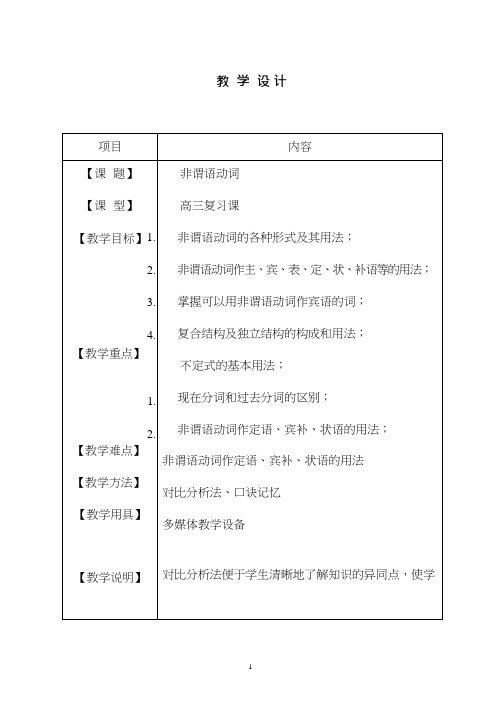
教学设计生能够从整体上把握知识脉络。
通过口诀记忆,使学生快速掌握,不容易遗忘。
在教学过程中,通过提问、启发等方式师生共同完成知识脉络,以达到较牢固的记忆及较理想的复习效果。
非谓语动词经常出现在高考题的语法填空、短文改错中,教学过程中的精选习题有助于学生及时地更好地掌握这部分语法知识。
【教学过程】课前预习(12 个单句语法填空)设计意图:通过练习,总结非谓语动词的形式,使学生对本节课的内容有大概的了解。
一、高考考纲解读近三年高考主要考查非谓语动词的作用和形式。
在作用方面主要考查作宾语时用不定式还是动名词;作宾语、状语、补语时用不定式还是分词;它们作某一成分时的特殊情况及特殊结构。
在形式方面主要考查用一般式还是完成式、主动式还是被动式、现在分词还是过去分词。
设计意图:使学生明确教学大纲的要求,了解其在考试中的重要性。
二、非谓语动词考点(二轮复习专家解读)1.不定式作宾语与动词的-ing 形式作宾语的区别2.不定式作宾补vs.分词作宾补的区别3.不定式作状语和分词作状语的区别4.不定式、现在分词和过去分词作定语的区别5.不定式的主动式和被动式作定语的区别6.动名词的复合结构作宾语时的代词转化7.带to 不定式和不带to 不定式8.不定式符号的单独使用设计意图:使学生细化知识点,掌握重难点。
三、非谓语动词思维导图及图表结构(结合时态和语态)设计意图:运用思维导图,一目了然,帮助学生有效记忆。
四、非谓语动词的句法功能归纳考点一非谓语动词作状语1.动词不定式作状语2.分词作状语3.独立成分作状语易错警示某些动词的过去分词已经形容词化,且常用于一些系表结构中,此时这些过去分词只表示一种状态,作状语时不表示被动关系,其前不用being。
语法训练吧:1.As the light turned green ,I stood for a moment ,not ,and asked myself what I was going to do.A.moved B.moving C.to move D.being moved2.an important role in a new movie,Andy has got a chance to become famous.A.Offer B.Offering C.Offered D.To offer考点二非谓语动词作定语1.过去分词作定语:2.现在分词作定语:3.动词不定式作定语:4.现在分词与动名词作定语的区别:语法训练吧:1.The idea you thought of a bridge over the river there sounds reasonable.A.build B.to build C.building D.built2.The ability an idea is as important as the idea itself.A .expressingB .expressedC .to expressD .to be expressed考点三非谓语动词作补语1.感官动词(词组)“一感”:f ee l“二听”:h ea r,li ste n to“五看”:see, watch, notice, observe, look at +宾语+1) 不带to 的不定式(表示主动和完成)2)现在分词(表示主动和正在进行)3)过去分词(表示被动和完成)2.make +宾语+do “让…做…”(与宾语为主动关系)make +宾语+done“让…被做”…”(与宾语为被动关系)3.let +宾语+do “让…做…”(与宾语为主动关系)let +宾语+be done“让…被做…”(与宾语为被动关系)4.have +宾语+do sth. 使…做某事have +宾语+doing sth. 使…持续做某事have+宾语+done 使…被做(宾语与宾补为逻辑上的被动关系)have sth. to do 有事要做(不定式作定语)注:have + sb. +doing 若用于否定句,不能容忍或不允许某人做某事。
独立主格课件高三英语二轮复习

独立主格结构在句中可以充当主语的同位语,例如:"The news that he had passed the exam pleased everyone."
独立主格结构在句中可以充当宾语的同位语,例如:"I have no idea what caused the accident, nor does anyone else."
0 3
独立主格结构 可以表示条件 状语,如“If it rains, we will cancel the picnic.”
0 4
充当定语
独立主格结构在 句中可以充当定 语,修饰前面的 名词或代词。
0 1
例如:The meeting being over, we went home.(独立主 格结构"The meeting being over"修饰名词 "we")
和贴切。
07
独立主格的练习与解析
练习题及解析
练习题:选择正 确的独立主格结
构完成句子。
解析:独立主格 结构的构成和用
法。
练习题:根据上 下文,选择合适 的独立主格结构
完成句子。
解析:独立主格 结构的特点和作
用。
练习题:改写句 子,使用独立主
格结构。
解析:独立主格 结构的常见错误
和注意事项。
常见错误及纠正方法
解析:本题考查独立主格 结构,要求考生理解句子
结构和语法规则
真题:2019年高考英语全 国卷III,第42题
(公用)高考英语二轮复习 非谓语动词和独立主格结构精品教案4
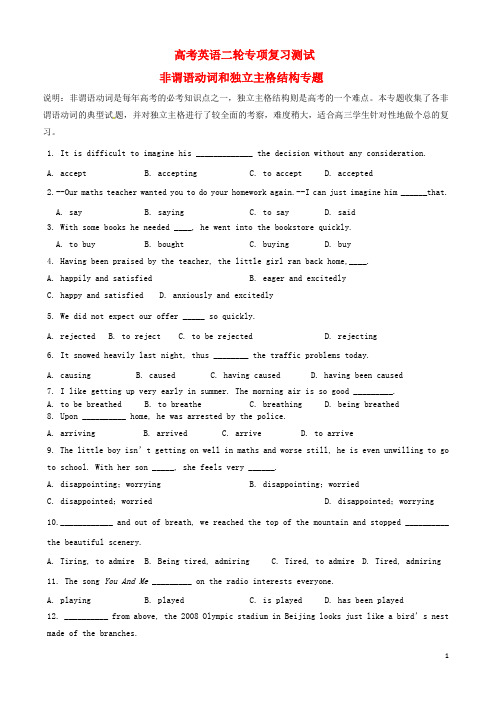
高考英语二轮专项复习测试非谓语动词和独立主格结构专题说明:非谓语动词是每年高考的必考知识点之一,独立主格结构则是高考的一个难点。
本专题收集了各非谓语动词的典型试题,并对独立主格进行了较全面的考察,难度稍大,适合高三学生针对性地做个总的复习。
1. It is difficult to imagine his _____________ the decision without any consideration.A. acceptB. acceptingC. to acceptD. accepted2.--Our maths teacher wanted you to do your homework again.--I can just imagine him ______that.A. sayB. sayingC. to sayD. said3. With some books he needed ____, he went into the bookstore quickly.A. to buyB. boughtC. buyingD. buy4. Having been praised by the teacher, the little girl ran back home,____.A. happily and satisfiedB. eager and excitedlyC. happy and satisfiedD. anxiously and excitedly5. We did not expect our offer _____ so quickly.A. rejectedB. to rejectC. to be rejectedD. rejecting6. It snowed heavily last night, thus ________ the traffic problems today.A. causingB. causedC. having causedD. having been caused7. I like getting up very early in summer. The morning air is so good _________.A. to be breathedB. to breatheC. breathingD. being breathed8. Upon __________ home, he was arrested by the police.A. arrivingB. arrivedC. arriveD. to arrive9. The little boy isn’t getting on well in maths and worse still, he is even u nwilling to go to school. With her son _____, she feels very ______.A. disappointing;worryingB. disappointing;worriedC. disappointed;worriedD. disappointed;worrying10.____________ and out of breath, we reached the top of the mountain and stopped __________ the beautiful scenery.A. Tiring, to admireB. Being tired, admiringC. Tired, to admireD. Tired, admiring11. The song You And Me _________ on the radio interests everyone.A. playingB. playedC. is playedD. has been played12. __________ from above, the 2008 Olympic stadium in Beijing looks just like a bird’s nest made of the branches.A. To seeB. SeeingC. SeenD. Having seen13. Sometimes she was dying____________ her husband about it.A. tellB. tellingC. to tellD. of telling14. Unless _____ to speak, you should remain silent at the conference.A. having invitedB. invitingC. being invitedD. invited15. At the sight of the policeman, ___from behind the door.A. did the boy rush outB. did he sit downC. out rushed the boyD. rushing out was the boy16. It will take us about an hour to get to the airport, _______ possible traffic delay.A. allowed forB. allowingC. allowedD. allowing for17. When he came back three hours later , they were still sitting on the sofa , _______________ in conversation.A. absorbingB. absorbedC. to absorbD. to be absorbed18. We had an anxious couple of weeks _____ for the results of the experiment.A. waitB. to be waitingC. waitedD. waiting19. Believe it or not, in the United States, 40% of the toys _____ are for adults.A. soldB. sellingC. to sellD. to be selling20.--The last one pays the meal. --Agreed!A. to arriveB. arrivesC. arrivedD. arriving答案1. B2. B解析:动词imagine后面常跟名词,代词,动名词或从句作宾语。
高考英语二轮复习 非谓语动词和独立主格结构精品教案4
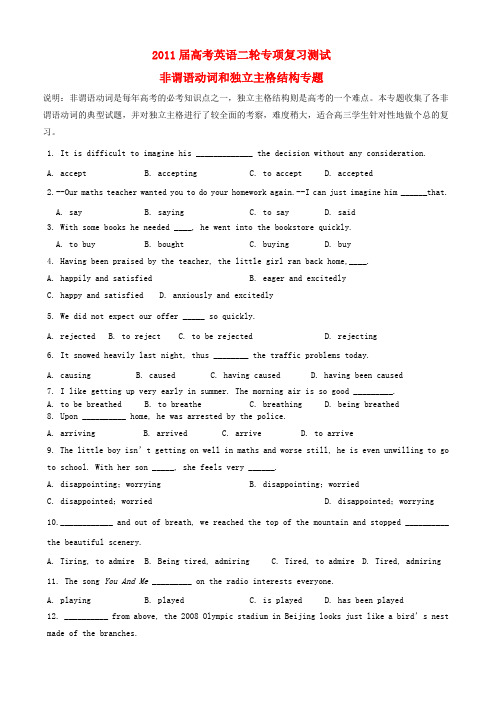
2011届高考英语二轮专项复习测试非谓语动词和独立主格结构专题说明:非谓语动词是每年高考的必考知识点之一,独立主格结构则是高考的一个难点。
本专题收集了各非谓语动词的典型试题,并对独立主格进行了较全面的考察,难度稍大,适合高三学生针对性地做个总的复习。
1. It is difficult to imagine his _____________ the decision without any consideration.A. acceptB. acceptingC. to acceptD. accepted2.--Our maths teacher wanted you to do your homework again.--I can just imagine him ______that.A. sayB. sayingC. to sayD. said3. With some books he needed ____, he went into the bookstore quickly.A. to buyB. boughtC. buyingD. buy4. Having been praised by the teacher, the little girl ran back home,____.A. happily and satisfiedB. eager and excitedlyC. happy and satisfiedD. anxiously and excitedly5. We did not expect our offer _____ so quickly.A. rejectedB. to rejectC. to be rejectedD. rejecting6. It snowed heavily last night, thus ________ the traffic problems today.A. causingB. causedC. having causedD. having been caused7. I like getting up very early in summer. The morning air is so good _________.A. to be breathedB. to breatheC. breathingD. being breathed8. Upon __________ home, he was arrested by the police.A. arrivingB. arrivedC. arriveD. to arrive9. The little boy isn’t getting on well in maths and worse still, he is eve n unwilling to go to school. With her son _____, she feels very ______.A. disappointing;worryingB. disappointing;worriedC. disappointed;worriedD. disappointed;worrying10.____________ and out of breath, we reached the top of the mountain and stopped __________ the beautiful scenery.A. Tiring, to admireB. Being tired, admiringC. Tired, to admireD. Tired, admiring11. The song You And Me _________ on the radio interests everyone.A. playingB. playedC. is playedD. has been played12. __________ from above, the 2008 Olympic stadium in Beijing looks just like a bird’s nest made of the branches.A. To seeB. SeeingC. SeenD. Having seen13. Sometimes she was dying____________ her husband about it.A. tellB. tellingC. to tellD. of telling14. Unless _____ to speak, you should remain silent at the conference.A. having invitedB. invitingC. being invitedD. invited15. At the sight of the policeman, ___from behind the door.A. did the boy rush outB. did he sit downC. out rushed the boyD. rushing out was the boy16. It will take us about an hour to get to the airport, _______ possible traffic delay.A. allowed forB. allowingC. allowedD. allowing for17. When he came back three hours later , they were still sitting on the sofa , _______________ in conversation.A. absorbingB. absorbedC. to absorbD. to be absorbed18. We had an anxious couple of weeks _____ for the results of the experiment.A. waitB. to be waitingC. waitedD. waiting19. Believe it or not, in the United States, 40% of the toys _____ are for adults.A. soldB. sellingC. to sellD. to be selling20.--The last one pays the meal. --Agreed!A. to arriveB. arrivesC. arrivedD. arriving答案1. B2. B解析:动词imagine后面常跟名词,代词,动名词或从句作宾语。
高考二轮复习英语学案——专题八 非谓语动词和独立主格结构 高三英语高考二轮复习:专题八 非谓语动词和
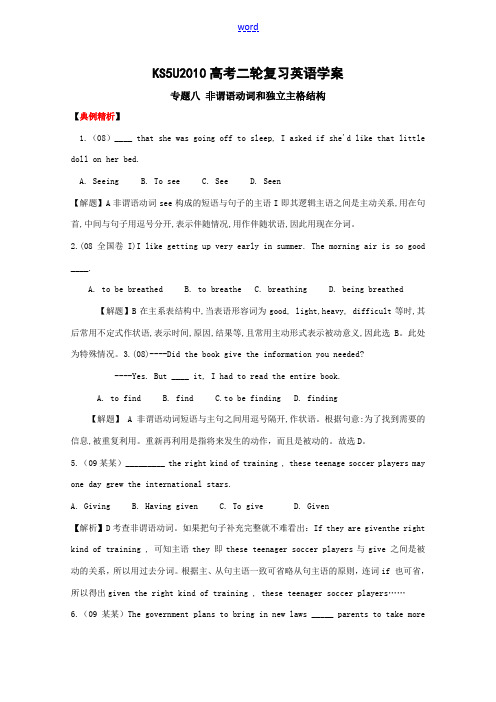
KS5U2010高考二轮复习英语学案专题八非谓语动词和独立主格结构【典例精析】1.(08)____ that she was going off to sleep, I asked if she'd like that little doll on her bed.A. SeeingB. To seeC. SeeD. Seen【解题】A非谓语动词see构成的短语与句子的主语I即其逻辑主语之间是主动关系,用在句首,中间与句子用逗号分开,表示伴随情况,用作伴随状语,因此用现在分词。
2.(08全国卷I)I like getting up very early in summer. The morning air is so good ____.A. to be breathedB. to breatheC. breathingD. being breathed【解题】B在主系表结构中,当表语形容词为good, light,heavy, difficult等时,其后常用不定式作状语,表示时间,原因,结果等,且常用主动形式表示被动意义,因此选B。
此处为特殊情况。
3.(08)----Did the book give the information you needed?----Yes. But ____ it, I had to read the entire book.A. to findB. findC.to be findingD. finding【解题】 A 非谓语动词短语与主句之间用逗号隔开,作状语。
根据句意:为了找到需要的信息,被重复利用。
重新再利用是指将来发生的动作,而且是被动的。
故选D。
5.(09某某)_________ the right kind of training , these teenage soccer players may one day grew the international stars.A. GivingB. Having givenC. To giveD. Given【解析】D考查非谓语动词。
2010高考二轮复习英语教案——专题八-非谓语动词和独立主格结构

2010高考二轮复习英语教案——专题八-非谓语动词和独立主格结构D定语、状语、表语等;掌握非谓语动词充当相同句子成分时的辨析;掌握非谓语动词在不同的语境、语义下的运用。
对于独立主格结构考纲要求掌握独立主格结构的构成方式;在句子中的作用以及with复合结构。
【教法指引】非谓语动词包括不定式、v-ing形式和过去分词,是高中英语学习的难点,也是高考考查的重点。
高中英语非谓语动词是一个重要考点,教师在引导学生复习备考中要注意重点突出、训练得当,尤其是对以下要点的复习:1.不定式、现在分词与过去分词的用法区别;2.非谓语动词的主动式与被动式;3.非谓语动词完成式的用法;4.非谓语动词用作伴随状语;5.非谓语动词用作目的状语;6.非谓语动词用作结果状语;7.非谓语动词用作宾语补足语;8.非谓语动词的逻辑主语问题;9.非谓语动词用作主语的问题;10.“(be+)过去分词+介词”结构;11.动名词的复合结构和there be结构的非谓语动词形式。
对于独立主格结构的复习,教师必须要讲清它的构成方式和在句子中的作用以及与with复合结构和分词之间的辨析的关系。
【知识网络】非谓语动词用法非谓语动词主要包括不定式、动名词和现在分词。
为了区分这三种不同的非谓语动词的用法和含义,我们将分别从三种非谓语动词在句子中做主语、宾语、宾语补足语、定语、状语、表语以及一些特殊结构句型等角度来区分其用法和细微含义。
1.不定式和动名词作主语的区别(1)动名词作主语通常表示抽象动作;而不定式作主语表示具体动作。
Smoz.x.x.kld一词,其后宾语只跟不定式,不能跟动名词。
例如:I should liz.x.x.kch, a lot 等习惯上用不定式做定语。
John will do anything but worz.x.x.kt shutting the door behind him.他出去后将门随手关上。
Not z.x.x.kt a word more spoken, he picked up the paper.没再多说一个字,他拾起那张纸。
高考英语二轮复习 非谓语动词和独立主格结构精品教案2
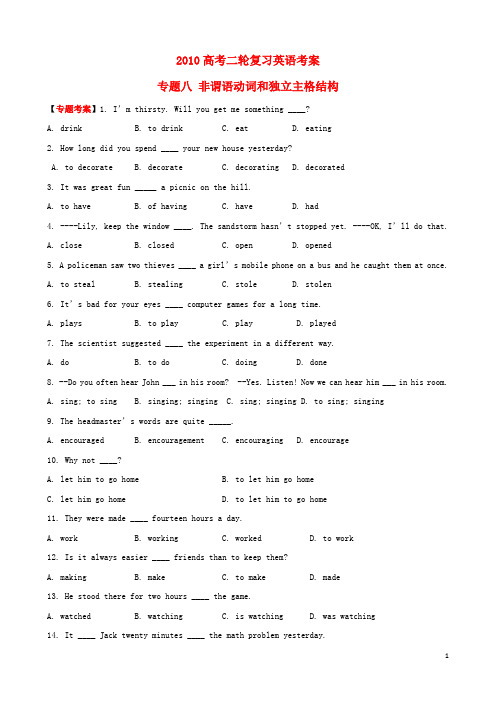
2010高考二轮复习英语考案专题八非谓语动词和独立主格结构【专题考案】1. I’m thirsty. Will you get me something ____?A. drinkB. to drinkC. eatD. eating2. How long did you spend ____ your new house yesterday?A. to decorateB. decorateC. decoratingD. decorated3. It was great fun _____ a picnic on the hill.A. to haveB. of havingC. haveD. had4. ----Lily, keep the window ____. The sandstorm hasn’t stopped yet. ----OK, I’ll do that.A. closeB. closedC. openD. opened5. A policeman saw two thieves ____ a girl’s mobile phone on a bus and he caught them at once.A. to stealB. stealingC. stoleD. stolen6. It’s bad for your eyes ____ computer games for a long time.A. playsB. to playC. playD. played7. The scientist suggested ____ the experiment in a different way.A. doB. to doC. doingD. done8. --Do you often hear John ___ in his room? --Yes. Listen! Now we can hear him ___ in his room.A. sing; to singB. singing; singingC. sing; singingD. to sing; singing9. The headmaster’s words are quite _____.A. encouragedB. encouragementC. encouragingD. encourage10. Why not ____?A. let him to go homeB. to let him go homeC. let him go homeD. to let him to go home11. They were made ____ fourteen hours a day.A. workB. workingC. workedD. to work12. Is it always easier ____ friends than to keep them?A. makingB. makeC. to makeD. made13. He stood there for two hours ____ the game.A. watchedB. watchingC. is watchingD. was watching14. It ____ Jack twenty minutes ____ the math problem yesterday.A. took; to work outB. takes; worked outC. has taken; work outD. is taking; working out15. When you leave, don’t forget ____ off the light.A. to turnB. turningC. turnD. turned16. Who do you think you’d like ____?A. to make friendsB. make friendsC. to make friends withD. make friends with17. Although Jeff loves KFC, he tries ____ it too often.A. to eatB. not eatC. to not eatD. not to eat18. --Hi, Betty. Shall we go swimming this Sunday?--This Sunday? I am sorry, I have a lot of homework ____ this Sunday.A. to doB. doneC. doD. to be done19. Sally had no pen ____ yesterday morning.A. to writeB. to write withC. writingD. writing with20. John asked David how ____ Christmas.A. celebratingB. to celebrateC. to be celebratedD. celebrate21. --Excuse me, sir. Look at the sign on the wall “NO ____”.--Oh, I’m sorry. I’ll never do it again.A. PARKEDB. SMOKEC. SPITTINGD. SMOKED22. ----Boys and girls, will you please ____ the park this afternoon? ----OK.A. not cleaning outB. not to clean outC. to clean upD. clean up23. Do you practice ______ English every morning?A. speakB. to speakC. speakingD. spoken24. The Great Green Wall will stop the wind from ____ the earth away.A. blowB. blowingC. blewD. to blow25. We all considered Mr Zhao ____ teacher.A. be the bestB. to be the bestC. being bestD. being the best26. My sister used to be fond of ____ table tennis.A. playB. playedC. playingD. to play27. How about ____?A. to go out for a walkB. go swimming in the riverC. visiting the sick children in the hospitalD. to having lunch in the restaurant28. It’s very kind ____ you to ____ me ____ the heavy bag.A. for; tell; to takeB. of; thank; forC. to; speak; to haveD. of; help; carry29. Have you decided ____?A. to go with whomB. whom to go withC. whom go withD. with whom to go30. Her hope ____ a gold medal in the 2008 Olympic Games.A. to winB. is to winC. winningD. will win31. The meeting room is big enough ____ one hundred people.A. holdingB. holdC. to holdD. holds32. Would you please pass me the knife ____?A. to cut the watermelon withB. to cut the watermelonC. cutting the watermelonD. cutting the watermelon with33. It is better to teach a man to fish than ____ him fish.A. givingB. to giveC. givesD. gave34. Jenny is interested in ____ in her free time.A. listened to the radioB. reading magazinesC. watch TVD. plays tennis35. The policeman warned the young man____ after drinking.A. never to driveB. to never driveC. never drivingD. never drive36. What do you think is the best way ____the wild animals?A. protectingB. to protectC. protectedD. protect37. I’d rather ____ on the land ____ in a factory.A. work; than workB. work; workC. to work; than to workD. to work; to work38. My grandfather is used ____ a hat in winter.A. to wearB. for wearingC. wearingD. to wearing39. She is ____with her mother this afternoon.A. going to shoppingB. going shoppingC. going to be shoppingD. go to shop40. The result of the game is ____.A. frustrateB. frustratingC. frustratedD. frustrates41. I’m sorry ____ you enough help.A. have givenB. of not givingC. not to have givenD. to have given42. Her brother was ____ at her words.A. annoyB. annoyingC. annoyedD.being annoying43. After the earthquake, almost all the windows are ____.A. breakB. brokeC. brokenD. breaking44. They are looking forward to ____ all over the world.A. travelB. traveledC. travelingD. be traveled45. Would you mind ____ because there’re so many children ____ here?A. smoke; playB. smoking; playingC. not smoking; playD. not smoking; playing46. Some students from Grade 9 ____ do some ____ for the old.A. volunteered to; cleanB. volunteered; cleaningC. volunteered to; cleaningD. volunteered; clean47. ____ English is much easier than speaking it.A. ReadB. To readC. ReadingD. Reads48. The young man was often seen ____ by the lake.A. to drawB. to drawingC. drawD. drew49. When he was in the office, he preferred ____ something ____ nothing.A. to do; than doB. to do; rather thanC. doing; rather than doingD. doing; to doing50. It’s too hot today. Why not ____ your coat?A. taken offB. to take offC. take offD. taking off51. When he was a boy, he used to go there and watch _____.A. to repair bicyclesB. bicycles to be repairedC. bicycles being repairedD. repairing bicycles52. --- Have you considered _____ your job as a teacher?--- Yes. I like the job because a teacher is often considered _____ a gardener.A. to change; to beB. to change; beingC. changing; beingD. changing; to be53. The dog, _____, will be made a good watchdog.A. to train properlyB. being trained properlyC. properly to trainD. trained properly54. _____ the diamond, he had to look for a place to hide it.A. Having stolenB. Having been stolenC. StolenD. Stealing55. ___ the front door ___, he had to enter the room through the back door.A. Seen; paintedB. Seeing; paintedC. Being seen; being paintedD. Seeing; being painted56. And there, almost _____ in the big chair, sat her little brother, who never had to be told to keep quiet.A. having lostB. losingC. to be lostD. lost57. He looked around and caught a man _____ his hand into the pocket of a passenger.A. putB. to be puttingC. to putD. putting58. To answer correctly is more important than _____.A. that you finish quicklyB. finishing quicklyC. to finish quicklyD. finish quickly59. The old farmer, _____ the badly injured and burnt soldier, came out of the burning farmhouse, calling continuously for help.A. supportingB. having supportedC. being supported byD. being supported60. In January , 2004, the Uni ted States successfully launched “Spirit”, a Mars Exploration Rover, _____ a new milestone in the history of mankind.A. it markedB. markingC. markedD. to mark61. It was getting dark; I found a car _____ in a pool by the side of the road.A. to be stuckB. stuckC. stickingD. stick62. You can’t imagine what great trouble they have _____ the problem _____.A. to solve; being talked aboutB. solving; discussingC. to solve; to talk aboutD. solving; being discussed63. The monument was built in honor of the explorer who was believed _____ the river.A. to have discoveredB. to have been discoveredC. to discoverD. having been discovered64. The thief fell to the ground, his left foot _____ and blood _____ down from his mouth.A. breaking; runningB. broken; runningC. breaking; runD. broken; run65. The program was so exciting that the children kept their eyes _____ on the screen.A. to fixB. to be fixedC. fixedD. fixing66. As I will be away for at least a year, I’d appreciate _____ from you now and then so thatI can know how everyone is getting along.A. having heardB. to hearC. hearingD. being heard67. _____, the subject was always in my mind.A. Walking or sleepingB. Walking or sleptC. Having walked or sleptD. To walk and sleep68. --- Did you get a dictionary?--- No, I _____, but there were not any _____.A. tried; to be leftB. had tried to; leavingC. tried to; leftD. had tried; have left69. When he came to, he found himself _____ on a chair, with his hands _____ back.A. to sit; tyingB. sitting; tyingC. seating; tiedD. seated; tied70. The joke told by Tom made us _____, so the teacher couldn’t make himself _____.A. to laugh; hearingB. laughing; heardC. laughing; hearD. laughed; heard71. All of the flowers now _____ here have developed from those once _____ in the forest.A. raised; grownB. rising; growingC. raised; growingD. rising; grown72. Henry can’t attend the party _____ at Tom’s house at present because he i s preparing the speech at the party _____ at Marie’s house tomorrow.A. held; being heldB. to be held; to be heldC. to be held; heldD. being held; to be held73. Seeing the soldiers well _____ for the flood-fight, the general nodded with satisfaction.A. prepareB. preparingC. preparedD. having prepared74. Don’t worry. I’ll have it _____ and get someone _____ it to you tomorrow.A. typed; sendB. to type; to sendC. type; sendD. typed; to send75. The sun was shining brightly, _____ everything there _____ more beautiful.A. making; lookB. to make; lookedC. and made; lookingD. and making; be looked76. How could he get the plan _____ without any one to support him?A. to carry outB. carry outC. carrying outD. carried out77. New ideas sometimes have to wait for years before _____.A. being fully acceptingB. fully acceptingC. having fully acceptedD. fully accepted78. Having passed all the tests, she felt a great weight _____ off her mind.A. takingB. takenC. takeD. to be taken79. I’m examining the article he has just finished _____ the possible mistakes in it.A. being correctedB. to correctC. correctedD. having corrected80. _____ full preparations, we decided to put off the meeting till next week.A. We did not makeB. Having not madeC. We had not madeD. Not having made81. We should prevent such a silly mistake _____ again.A. occurringB. to occurC. to be occurredD. from being occurred82. I regret _____ hard at school, or I would have succeeded in passing the exam.A. not to workB. having not workedC. to have not workedD. not having worked83. They looked forward with hope _____ a chance to receive further education.A. for gettingB. of gettingC. to getD. to getting84. “Well, I’ll tell you a secret ...” said the boy, with his mouth almost _____ my ear.A. touchedB. touchingC. touchD. to touch85. Towards evening, the patient opened his mouth as if _____ something to his son.A. saidB. sayC. to sayD. to have said86. --- Would you be _____ lend me your bicycle?--- Sure.A. so kind as toB. kind enough as toC. very kind toD. so kind to87. The beach is so beautiful that it is worthwhile, I think, _____ for a short holiday.A. of goingB. to be goingC. your goingD. you to go88. The teacher asked more _____ to prevent the students’ eyes from being injured.A. to doB. doneC. to be doneD. being done89. Some of the schools in Shanghai have moved one step closer to _____ with the global education community.A. being connectedB. connectC. having connectedD. be connected90. The performance of the host, _____ to please the audience and draw their attention, was greeted with a cold silence, however.A. had intendedB. intendedC. being intendedD. to intend91. _____ and out of breath, we reached the top of the mountain and stopped _____ the beautiful scenery.A. Tiring; to admireB. Being tired; admiringC. Tired; to admireD. Tired; admiring92. The 18-storeyed building, when _____, will shut out the sun _____ up the rooms in my house.A. completed; lightedB. completing; lightingC. completing; lightedD. completed; lighting93. --- I hear Warren _____ in a middle school.--- What? I can’t imagine him _____ as a teacher.A. teaches; workingB. teaches; workC. teach; to workD. teach; working94. ____ he’s only been learning English for a yea r, he speaks it very well.A. ConsideredB. ConsideringC. Having consideredD. To consider95. It was _____ computer games that cost the boy a lot of time that he ought to have spent on his lessons.A. to have playedB. playingC. playedD. having played96. At no time does the salesgirl get up late in the morning, for she is always too busy _____a good rest.A. to takeB. takingC. tookD. taken97. _____ as the most excellent student in her university, as most classmates had expected, made her parents very happy.A. Mary was chosenB. Mary chosenC. Mary being chosenD. Mary’s being chosen98. _____ the big snake, the little girl stood under the tree _____ to death.A. Seeing; frightenedB. Seeing; frighteningC. Seen; frightenD. To see; frightening99. You will see this product made in this factory _____ wherever you go.A. to be advertisedB. advertisedC. advertiseD. advertising100. Mr. Green is said _____ an experiment to prove the new method of solving the problem when young.A. to doB. to have doneC. to be doingD. to have been doing101.The weather ___ fine, they decided to go out for a walk.A. wereB. wasC. isD. being102.The composition given by the teacher___ , Alice went to watch TV.A. being done wellB. has been done wellC. having done wellD. done well103. The last plane___ , they had to stay in the hotel for another night.A. leftB. having leftC. having been leftD. be leaving104. It is a beautiful village with a mountain____ it.A. SurroundedB. surroundingC. havingsurrounded D. having been surrounded105. Everything___ into consideration, his work is well done.A. takingB. takenC. has been takenD. being taken106. All his work___, he left his office at ease.A. finishedB. had been finishedC. finishingD. to finish107.The power station was built on the river with our village and some othe rs___ with electricity.A. to supplyB. suppliedC. supplyingD. having supplied108. ____five minutes____ before the last train left, we arrived at the station.A. There being; to goB. It was; leftC. It had; leftD. There was; to go109. Christmas____, the family was full of excitement.A. was then only days awayB. were then only days awayC. then only days awayD. having been then only days away110. They first reach an agreement on the basic principle, the details ____later A. to work it out B. having been worked outC. to be worked outD. being worked out111. The purse_____, they went to the police.A. not yet foundB. hasn’t been foundC. being not foundD. not having yet found112. They sat in the room with the curtains_____.A. drawingB. having been drawnC. drawnD. being drawn113. Cars_____, they were punished by the police.A. parking illegallyB. parked illegallyC. being parked illegallyD. having parked illegally114. Mr. Smith stood beside the window, his attention ____ the car outside.A. focus onB. focusing uponC. focused onD. been focused on115. There____, we left.A. being nothing else to doB. is nothing else to doC. was nothing else to doD. having nothing else to do参考答案1--5 BCABB 6--0 BCCCC 11--15 DCBAA 16—20 CDABB 21—25 CDCBB 26—30 CCDBB31—35 CABBA 36—40BADBB 41—45 CCCCD 46—50CCADC 51-55 CDDAD 56-60 DDCAB61-65 BDABC 66-70 CACDB 71-75 CDCDA 76-80 DDBBD 81-85 ADDBC 86-90 ACCAB 91-95 CDABB 96-100 ADABB 101-105 DDBBB 106-110 ABACC 111-115 ACBCA。
独立主格结构高三英语必修教案教学设计
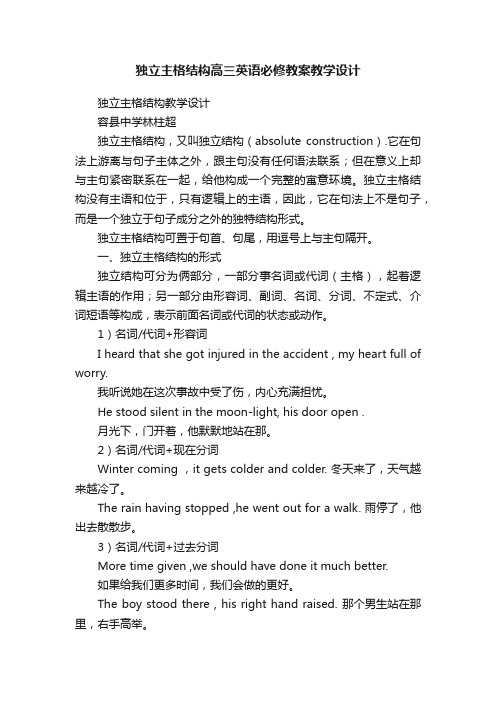
独立主格结构高三英语必修教案教学设计独立主格结构教学设计容县中学林柱超独立主格结构,又叫独立结构(absolute construction).它在句法上游离与句子主体之外,跟主句没有任何语法联系;但在意义上却与主句紧密联系在一起,给他构成一个完整的寓意环境。
独立主格结构没有主语和位于,只有逻辑上的主语,因此,它在句法上不是句子,而是一个独立于句子成分之外的独特结构形式。
独立主格结构可置于句首、句尾,用逗号上与主句隔开。
一、独立主格结构的形式独立结构可分为俩部分,一部分事名词或代词(主格),起着逻辑主语的作用;另一部分由形容词、副词、名词、分词、不定式、介词短语等构成,表示前面名词或代词的状态或动作。
1)名词/代词+形容词I heard that she got injured in the accident , my heart full of worry.我听说她在这次事故中受了伤,内心充满担忧。
He stood silent in the moon-light, his door open .月光下,门开着,他默默地站在那。
2)名词/代词+现在分词Winter coming ,it gets colder and colder. 冬天来了,天气越来越冷了。
The rain having stopped ,he went out for a walk. 雨停了,他出去散散步。
3)名词/代词+过去分词More time given ,we should have done it much better.如果给我们更多时间,我们会做的更好。
The boy stood there , his right hand raised. 那个男生站在那里,右手高举。
4)名词/代词(主格)+不定式Here are the first two volumes , the third one to come out next month.这是前俩卷,第三卷将于下雨问世。
- 1、下载文档前请自行甄别文档内容的完整性,平台不提供额外的编辑、内容补充、找答案等附加服务。
- 2、"仅部分预览"的文档,不可在线预览部分如存在完整性等问题,可反馈申请退款(可完整预览的文档不适用该条件!)。
- 3、如文档侵犯您的权益,请联系客服反馈,我们会尽快为您处理(人工客服工作时间:9:00-18:30)。
2010高考二轮复习英语教案专题八非谓语动词和独立主格结构【专题要点】非谓语动词和独立主格结构主要用法如下:1.动名词和动词不定式作主语、宾语;2.只跟动名词作宾语的动词或动词短语;3.只跟动词不定式作宾语的常见动词;4.既可以跟动名词又可以跟动词不定式作宾语,且意义不同的动词或短语;5.不定式、现在分词、过去分词作宾语补足语的区别;6.不定式、现在分词、过去分词作定语时的区别;7.不定式、现在分词、过去分词作状语时的区别;8.动名词的复合结构在句中作状语;9.there be 结构的两种非谓语形式;10.独立主格结构在句中作状语;11.with复合结构在句中作状语或定语。
【考纲要求】非谓语动词包括不定式、动词-ing形式和过去分词三种形式。
动词的非谓语形式是中学英语语法的重点和难点,也是每年高考热点中的热点, 考纲要求掌握:非谓语动词的时态和语态;他们在英语句子中的作用;非谓语动词的基本用法和含义,非谓语动词在句子中可以充当多种句子成分,比如主语、宾语、宾语补足语、定语、状语、表语等;掌握非谓语动词充当相同句子成分时的辨析;掌握非谓语动词在不同的语境、语义下的运用。
对于独立主格结构考纲要求掌握独立主格结构的构成方式;在句子中的作用以及with复合结构。
【教法指引】非谓语动词包括不定式、v-ing形式和过去分词,是高中英语学习的难点,也是高考考查的重点。
高中英语非谓语动词是一个重要考点,教师在引导学生复习备考中要注意重点突出、训练得当,尤其是对以下要点的复习:1.不定式、现在分词与过去分词的用法区别;2.非谓语动词的主动式与被动式;3.非谓语动词完成式的用法;4.非谓语动词用作伴随状语;5.非谓语动词用作目的状语;6.非谓语动词用作结果状语;7.非谓语动词用作宾语补足语;8.非谓语动词的逻辑主语问题;9.非谓语动词用作主语的问题;10.“(be+)过去分词+介词”结构;11.动名词的复合结构和there be 结构的非谓语动词形式。
对于独立主格结构的复习,教师必须要讲清它的构成方式和在句子中的作用以及与with复合结构和分词之间的辨析的关系。
【知识网络】非谓语动词用法非谓语动词主要包括不定式、动名词和现在分词。
为了区分这三种不同的非谓语动词的用法和含义,我们将分别从三种非谓语动词在句子中做主语、宾语、宾语补足语、定语、状语、表语以及一些特殊结构句型等角度来区分其用法和细微含义。
1.不定式和动名词作主语的区别(1)动名词作主语通常表示抽象动作;而不定式作主语表示具体动作。
Smoz.x.x.kld一词,其后宾语只跟不定式,不能跟动名词。
例如:I should liz.x.x.kch, a lot 等习惯上用不定式做定语。
John will do anything but worz.x.x.kt shutting the door behind him.他出去后将门随手关上。
Not z.x.x.kt a word more spoken, he picked up the paper.没再多说一个字,他拾起那张纸。
(借此结构;表伴随)6、The last guest to arrive, our party was started.最后一位客人到了,我们的晚会开始了。
(名词+不定式;表时间)五、独立主格结构与分词短语作状语的异同:1、独立主格结构与分词短语都可以转化成状语从句。
但是,独立主格结构转换成状语从句后,有自己的逻辑主语,与主句的主语不一致;而分词短语转化为状语从句后,从句的主语与主句的主语相同。
例:⑴ If ti me permit, we’d better have a rest at this weekend. -→Time permitting,we’d better have a rest at this weekend.如果时间允许,本周末我们最好休息一下。
⑵ When we see from the top floor, we can find the garden more beautiful. -→Seeing from the top floor, we can find the garden more beautiful. 从顶楼上看,花园更漂亮。
2、还应该注意,分词结构的逻辑主语不是总和主句的主语一致,而是主句的其他成分。
语法上称作“依着原则”;有些分词结构在句子上找不到它的逻辑主语,语法上称作“悬垂分词”。
例:⑴ Looking for my watch in the room, it had taken me a long time. 在屋里找表,用了我很长时间。
(依着原则)⑵ When planting these flowers, care must be taken not to damage the root. (我们)种花时必须小心,不能碰坏花根。
(悬垂分六、独立主格结构与独立成分的异同:1、有的分词短语可以独立存在,在句子中没有逻辑上的主语,实际上已经成了习惯短语。
这些短语有:generally speaking; frankly speaking; judging from; supposing等等。
例:⑴ Generally speaking, the rule is very easy to understand.总的来说,这个规则很容易懂。
⑵ Judging from what he said, she must be an honest girl. 根据他所说的,她一定很诚实。
2、有些固定短语是带to的不定式,表明说话人的立场和态度,在句中作独立成分。
这些短语有:to be honest; to be sure; to tell you the truth; to cut a long story short; to be frank; to make the matter worse等等。
例:⑴ To tell you the truth, what I said at the meeting was not my opinion. 说实话,我在会上说的并不是我的意见。
⑵ To make the matter worse, he locked his keys in the car. 更糟糕的是,他把钥匙锁在车里了七、非谓语动词独立主格结构在独立主格结构中,非谓语动词和它前面的名词或代词存在着逻辑上的主谓关系。
Such an able man to help you,you will surely succeed sooner or later.有这么能干的人来帮你, 你迟早一定会成功的。
(such an able man和to help you 之间存在着主谓关系)= Since such an able man will help you, you will surely succeed sooner or later.He seating himself at the desk, his mother began to tell him a story.他在书桌旁坐好后,他母亲开始给他讲故事。
(seating himself at the desk拥有了自己的逻辑主语he,注意是“主格”)= When he seated himself at the desk, his mother began to tell him a story.The key to the bike lost, he had to walk to school.由于丢了自行车钥匙,他只好步行去学校。
(lost 的逻辑主语是the key,lost 也可以用完成式having been lost)= Because the key to the bike had been lost, he had to walk to school.A.不定式“独立主格结构”在“逻辑主语+动词不定式”结构中,动词不定式和它前面的名词或代词存在着逻辑上的主谓关系。
这种结构也可用一个从句或并列分句来表达。
1.动词不定式用主动的形式在独立主格结构中,动词不定式和它前面的名词或代词存在着逻辑上的主谓关系。
His mother to come tonight,he is busy preparing the dinner.他母亲今晚要来,他正在忙着准备饭菜。
(= As his mother is to come tonight, he is busy preparing the dinner.)——will you go to the concert tonight 你今晚去听音乐会吗?——sorry. So many exercise-books to check, I really can't afford any time.对不起,有这多的作业要批,我真的抽不出时间。
(=Because I shall check so many exercise-books tonight ,I really can't afford any time.)The four of us agreed on a division of labour , each to translate a quarter of the book.我们四人同意分工干,每人翻译全书的四分之一。
(=The four of us agreed on a division of labour and each is to translate a quarter of the book.)Many trees,flowers,and grass to be planted, our newly-built school will look even more beautiful. 种上许多的树,花和草后,我们新建的学校将看上去更美。
(=If many trees,flowers,and grass are planted,our newly-built school will look even more beautiful.)B.-ing形式“独立主格结构”动词的-ing形式作状语时,其逻辑主语一般应与句子的主语保持一致。
Being ill, he went home.由于生病,他回家了。
(= As he was very ill, he went home.)Seating himself at the desk, he began to read a magazine.在课桌旁坐好后,他开始看杂志。
